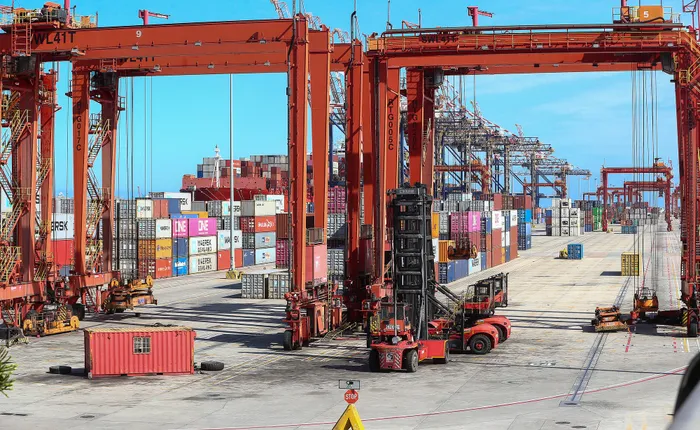Navigating a fractured global order: South Africa’s role as a global pivot

With economic uncertainty, geopolitical polarisation and climate volatility redefining global relationships, South Africa's presidency could shape the terms of engagement for a new development compact.
Image: Leon Lestrade/ Independent Newspapers
In 2025, as global trade fractures under $1.7 trillion in new tariffs and climate-related losses reach $600 billion annually, South Africa steps into the G20 presidency.
It does so not as a bystander, but as a pivotal actor in rebalancing an increasingly fractured multipolar world. With economic uncertainty, geopolitical polarisation and climate volatility redefining global relationships, South Africa's presidency could shape the terms of engagement for a new development compact.
The global economy is entering a prolonged and disruptive transition.
The United States faces unsustainable debt dynamics, with a debt-to-GDP ratio exceeding 122% and a budget deficit expected to reach 7% by 2030.
Its rising tariffs on Chinese goods and intensifying rhetoric are pushing the global economy into a state of strategic decoupling.
The resulting trade fragmentation, coupled with retaliatory measures, has triggered significant volatility across supply chains, capital flows and energy prices. Brent crude remains elevated, while global borrowing costs continue to climb.
In parallel, artificial intelligence is advancing faster than regulatory frameworks can adapt. McKinsey estimates that 30% of global jobs face automation by 2030, with uneven impacts across the Global South.
Meanwhile, climate shocks have become an annual economic drain, with the International Monetary Fund reporting $1 trillion in global losses linked to extreme weather.
These overlapping pressures are not only reshaping the geopolitical map, but also redefining the social contract between governments and citizens.
At a time when multilateralism is under strain and traditional leadership vacuums widen, the importance of credible, pragmatic and representative voices on the global stage has never been greater.
Amid these systemic pressures, traditional institutions are losing traction.
Many global governance frameworks remain stuck in a post-war logic, unfit for the complex, digitally driven and climate-constrained world that has emerged.
The Global South, long underrepresented in decision-making, is now demanding a seat at the table.
South Africa, bridging BRICS and the G7, sits at the intersection of competing geopolitical and economic currents. It has the credibility to raise difficult questions and the historical legitimacy to champion more equitable global outcomes.
President Cyril Ramaphosa encapsulated this vision aptly, stating that “South Africa’s G20 presidency is an opportunity to show that emerging economies can lead with solutions grounded in inclusivity, sustainability and fairness.”
This underscores the country’s commitment to demonstrating leadership that is both pragmatic and deeply connected to the realities of developing nations.
Yet its domestic position remains fragile. South Africa’s youth unemployment rate remains above 45%. Income
inequality is among the highest in the world, with a Gini coefficient of 0.63.
The mining sector, still central to the export base, is vulnerable to external shocks including slowing Chinese demand and tightening commodity prices.
Internally, rising debt levels — now exceeding 70% of GDP — and fiscal constraints have left little room to manoeuvre. These challenges, however, are not liabilities. They lend authenticity and urgency to South Africa’s G20 agenda, anchoring its voice in the lived realities of many developing nations.
To deliver a meaningful legacy, South Africa can advance four strategic priorities. Each speaks not only to domestic renewal but also to the structural transformation required in a world where economic, technological and climate risks are no longer abstract forecasts but real-time pressures:
Enhance fiscal resilience
South Africa must consolidate spending while pursuing intelligent initiatives that preserve growth. State-owned enterprises remain a key pressure point, drawing an estimated R30 billion annually in bailouts.
Building on international best practice, South Africa can adopt AI-powered fiscal analytics — similar to Singapore’s GovTech model — to optimise expenditure, improve transparency and redirect savings into growth-enabling investments.
Accelerate regional economic integration
The African Continental Free Trade Area (AfCFTA) has the potential to boost intra-African trade by 50% by 2030.
South Africa should champion the digitalisation of customs systems, explore blockchain applications for trade facilitation and support cross-border infrastructure that integrates industrial value chains.
These interventions will buffer African economies from external shocks and re-anchor growth within the continent.
Build a future-fit workforce
In an era of rapid technological disruption, a national reskilling drive through public–private partnerships can equip young people for AI-driven sectors. Global benchmarks such as India’s Skill India programme offer valuable lessons.
The World Economic Forum estimates that reskilling one million South African workers by 2030 could add up to R50 billion to GDP.
This would not only reduce unemployment but also build a more competitive economy.
Elevate climate adaptation and finance
South Africa’s Just Energy Transition Partnership, backed by $8.5 billion in pledged financing, sets a precedent for how climate commitments can be translated into localised, job-creating investments. The G20 presidency provides an opportunity to call for an African Climate Data Hub linked to real-time resource needs and risk profiles.
This would help direct a portion of the $100 billion global climate finance pledge to the most vulnerable regions.
These priorities are not exhaustive, nor are they easy to implement. Yet the power of the G20 presidency lies not in solving every challenge, but in framing the world’s most urgent questions and shaping the coalitions that will address them.
South Africa’s success will be defined not by lofty statements, but by whether it can leave a legacy of progress.
By 2030, its G20 presidency could be remembered as the moment Africa redefined multilateral cooperation — securing overdue climate financing, doubling intra-African trade and equipping a generation with future-fit skills.
This is not a call to act. It is a blueprint for a more balanced, more prepared and more just global system.
Nomvula Zeldah Mabuza is a Risk Governance and Compliance Specialist with extensive experience in strategic risk and industrial operations. She holds a Diploma in Business Management (Accounting) from Brunel University, UK, and is an MBA candidate at Henley Business School, South Africa.

Nomvula Zeldah Mabuza is a Risk Governance and Compliance Specialist with extensive experience in strategic risk and industrial operations. She holds a Diploma in Business Management (Accounting) from Brunel University, UK, and is an MBA candidate at Henley Business School, South Africa.
Image: Supplied
BUSINESS REPORT
Visit: www.businessreport.co.za